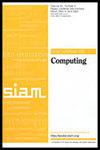Improved Truthful Mechanisms for Combinatorial Auctions with Submodular Bidders
IF 1.6
3区 计算机科学
Q3 COMPUTER SCIENCE, THEORY & METHODS
引用次数: 0
Abstract
A longstanding open problem in algorithmic mechanism design is to design truthful mechanisms that are computationally efficient and (approximately) maximize welfare in combinatorial auctions with submodular bidders. The first such mechanism was obtained by Dobzinski, Nisan, and Schapira [Proceedings of the 37th Annual ACM Symposium on Theory of Computing, Baltimore, MD, ACM, New York, 2005, pp. 610–618] who gave an -approximation, where is the number of items. This problem has been studied extensively since, culminating in an -approximation mechanism by Dobzinski [Proceedings of the 48th Annual ACM SIGACT Symposium on Theory of Computing, STOC 2016, Cambridge, MA, ACM, New York, 2016, pp. 940–948]. We present a computationally-efficient truthful mechanism with an approximation ratio that improves upon the state-of-the-art by an exponential factor. In particular, our mechanism achieves an -approximation in expectation, uses only demand queries, and has universal truthfulness guarantee. This settles an open question of Dobzinski on whether is the best approximation ratio in this setting in the negative.子模块竞价组合拍卖的改进诚实机制
在算法机制设计中,一个长期存在的开放问题是,在具有子模块投标人的组合拍卖中,设计具有计算效率和(近似)最大化福利的真实机制。第一个这样的机制是由Dobzinski, Nisan和Schapira获得的[第37届ACM计算理论研讨会论文集,巴尔的摩,MD, ACM,纽约,2005,pp. 610-618],他们给出了一个-近似,其中是项目的数量。自那以后,这个问题得到了广泛的研究,最终由Dobzinski提出了一个近似机制[第48届ACM SIGACT计算理论研讨会论文集,STOC 2016, Cambridge, MA, ACM, New York, 2016, pp. 940-948]。我们提出了一种计算效率高的真实机制,其近似比通过指数因子提高了最先进的水平。特别地,我们的机制实现了期望的-近似,只使用需求查询,并具有普遍的真实性保证。这就解决了Dobzinski的一个悬而未决的问题,即在这种情况下,最佳近似比率是否为负值。
本文章由计算机程序翻译,如有差异,请以英文原文为准。
求助全文
约1分钟内获得全文
求助全文
来源期刊

SIAM Journal on Computing
工程技术-计算机:理论方法
CiteScore
4.60
自引率
0.00%
发文量
68
审稿时长
6-12 weeks
期刊介绍:
The SIAM Journal on Computing aims to provide coverage of the most significant work going on in the mathematical and formal aspects of computer science and nonnumerical computing. Submissions must be clearly written and make a significant technical contribution. Topics include but are not limited to analysis and design of algorithms, algorithmic game theory, data structures, computational complexity, computational algebra, computational aspects of combinatorics and graph theory, computational biology, computational geometry, computational robotics, the mathematical aspects of programming languages, artificial intelligence, computational learning, databases, information retrieval, cryptography, networks, distributed computing, parallel algorithms, and computer architecture.
 求助内容:
求助内容: 应助结果提醒方式:
应助结果提醒方式:


